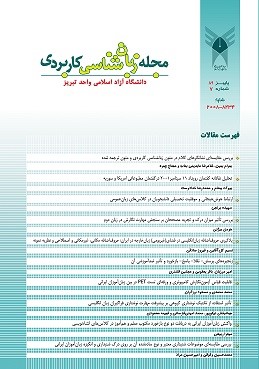The Relationship between Emotional Intelligence and Students` Academic Achievements in General EFL Classes
محورهای موضوعی : language teaching
1 - Osku Branch, Islamic Azad University, Osku, Iran
کلید واژه: emotional intelligence, foreign language learning,
چکیده مقاله :
Emotional Intelligence, the ability to be aware of, understand, and express oneself, the ability to be aware of, understand, and relate to others, the ability to deal with strong emotions, and the ability to adapt to change and solve problems of a social or personal nature, can be considered an important factor in learning a language as it enhances the verbal fluency which is the ultimate goal in FLL. The present study intended to consider the relationship between emotional intelligence and academic performance in Osku-Iran Islamic Azad University`s EFL classes. For this purpose, 110 undergraduate EFL sophomore and junior students participated in this study. First, in the middle of the term they were required to complete Bar-On (1997) Emotional Intelligence Inventory and their EI scores were computed based on the guidelines Bar-On (1997) provided. At the end of the term the academic course final exam was administered to the students to achieve their academic mean score which was computed out of 20. After that the degree of correlation between EI and academic mean score was found. It became evident that there is no meaningful relationship between total EI score and academic mean score but there is a meaningful and positive relationship between some sub-scales of emotional intelligence and academic mean score. Therefore, material developers and syllabus designers are required to take emotional factors into account when they want to design syllabuses or make materials ready for teaching.
هوش هیجانی، استعدادی برای آگاهی، فهم و بیان خود، استعدادی برای آگاهی، فهم و ارتباط با دیگران، توانایی برای ارتباط با احساسات عمیق و توانایی برای سازگاری با تغییرات و حل مشکلات فردی و اجتمایی، به عنوان یک عامل اساسی و مهم در یادگیری یک زبان محسوب می شود به خاطر اینکه هوش هیجانی باعث افزایش روانی کلام می شود که هدف اصلی و نهایی در یادگیری یک زبان خارجی است. این مقاله در نظر دارد همبستگی بین هوش هیجانی و موفقیت تحصیلی دانشجویان را در کلاس های زبان خارجی دانشگاه آزاد اسلامی اسکو مورد بررسی قرار دهد. به منظور این هدف، 110 نفر از دانشجویان سال دوم و سوم در کلاس های زبان خارجی دانشگاه آزاد اسلامی اسکو در این بررسی شرکت کردند. در ابتدا از دانشجویان در اواسط ترم خواسته شد تا پرسشنامه مربوط به هوش هیجانی Bar-On (1997) را کامل کنند. بعد نمره های هوش هیجانی بر اساس دستورالعملهای ارائه شده توسط Bar-On (1997) محاسبه شد. در آخر نیمسال تحصیلی برای به دست آوردن میانگین نمره تحصیلی، امتحان پایان ترم با نمره 20 از دانشجویان به عمل آمد. در پایان درجه همبستگی بین هوش هیجانی و نمره میانگین تحصیلی محاسبه شد. نتیجه بررسی مشخص کرد که بین نمره کل هوش هیجانی و نمره میانگین تحصیلی همبستگی معنا داری وجود ندارد اما بین تعدادی از زیر مقیاس های هوش هیجانی و نمره میانگین تحصیلی ارتباط معنا داری وجود دارد.امید است که برنامه ریزهای تحصیلی و نویسندگان طرح درس عوامل عاطفی موثر در یادگیری زبان را در نوشتن طرح درس و یا آماده سازی مطالب درسی در نظر بگیرند.
Aghasafari, M. (2006). On the relationship between emotional intelligence and language learning strategies. M.A. Thesis, Allameh Tabataba'ii University, Tehran.
Bar-On, R. (1997). Bar On emotional quotient inventory technical manual. Toronto: Multi-Health Systems.
Bar-On, R. (2002). Bar On emotional quotient inventory short form (EQi: S) Technical Manual. Toronto: Multi-Health Systems.
Binet, A. (1905). A propos la mesure de l’ intelligence. L’ Annee Psychol, 2, 411–465.
Dawda, D. & Hart, S.D. (2000). Assessing emotional intelligence: Reliability and validity of the Bar-On emotional Quotient inventory (1997a; 2000) in university students. Personality and Individual Differences, 28, 797-812.
Eagan, M. Kevin, & Jaeger, Audrey J. (2007). Exploring the value of emotional intelligence: a means to improve academic performance. NASPA Journal, 44 (3), 512- 537.
Elder, L. (1997). Critical thinking: The key to emotional intelligence. Journal of Developmental Education, 21(1), 40–41.
Fahim, M., & Pishghadam, R. (2007). On the role of emotional, psychometric, and verbal intelligences in the academic achievement of university students majoring in English language. Asian EFL Journal, 9, 240–253.
Goleman, D. (1995). Emotional intelligence. New York: Bantam.
Love, P. G. & Guthrie, V. L. (Eds.) (1999). Understanding and applying cognitive development theory. New Directions for Student Services, 88, San Francisco: Jossey-Bass.
Low, Gary R. & Nelson Darwin B. (2005).The role of transformative learning in academic excellence. Texas A & M University-Kingsville, College of Education - Rhode Hall 103.
Mayer, J.D. & Geher, G. (1996). Emotional intelligence and the identification of emotion. Journal of Intelligence, 22, 89–113.
Mayor, J. D., Salovey, p., & Caruso D. (2000). Models of emotional intelligence, in R. Sternberg (ed.). Handbook of intelligence, 3-24. Cambridge: Cambridge University Press.
Pishghadam, Reza, (2009). A quantitative analysis of the relationship between emotional intelligence and foreign language learning. Electronic journal of Foreign Language Learning, 6 (1), 31-41.
Salovey, P. & Mayer, J. (1990). Emotional intelligence. Imagination, cognition, and personality, 9, 185–211.
Smith, M. (2004). An Emotional Intelligence Intervention program for Academic at-Risk High School Students. Unpublished doctoral dissertation. Texas A&MUniversity-Corpus Christi.
Translated version Of Bar-On Emotional Intelligence Inventory, (1997). Sina Behavioral Science Research Center.
Vaidhyanathan, J. (2010). Role of emotional intelligence in teaching Russian as a foreign language. LSCAC Proceedings, 304-315.
Wechsler, D. (1958). The measurement and appraisal of adult intelligence. Fourth edition, Baltimore, MD: The Williams & Wilkins Company.


